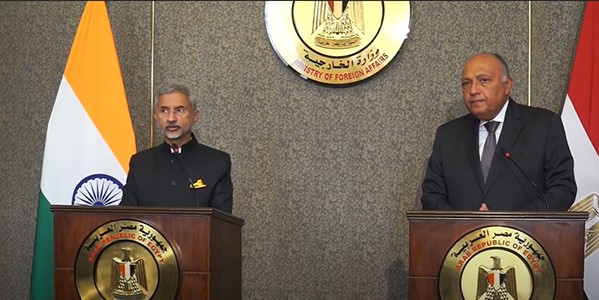External Affairs Minister Dr S. Jaishankar’s recently made his maiden official two-day visit to Cairo. He met his Egyptian counterpart Sameh Hassan Shoukry from October 15 -16 and revisited a gamut of bilateral, regional and international issues of mutual interests. India and Egypt are also celebrating 75 years of diplomatic relations this year. To commemorate the occasion, Egypt released a postal stamp. Both countries hold warm long-civilization ties rooted in history.
They are great ancient civilizations bound together by time-tested, people-to-people contact. Trade and commerce carried ideas, values, and culture and established connections as far back as 3000 B.C. The first spark of friendship in the modern era resulted from their mutual experiences against Britain’s colonial empire. The practical and common concerns built stronger bonds between the political leaders of both countries, ultimately shaping the Non-Alignment Movement. The personal equation between Nehru and Nasser and their support for each other during the formative years shaped the foreign policies towards each other. Indian leaders like Gandhi, Maulana Azad, Subhas Bose, and others maintained personal contact with Egyptian nationalist leaders like Saad Zaghlul Pasha and Nahas Pasha. Nehru’s psychological support for Nasser during the Suez crisis of 1956 and their struggle against British colonialism ultimately resulted in India gaining independence in 1947 and Egypt in 1956, respectively.. The secular socialist ideologies and opposition to major military pacts created mutual interest and fostered relations that peaked at the Bandung Conference of April 1955. Goa issue in 1961 and Nasser’s mediation in the Indo-China war of 1962 witnessed Egypt’s whole-hearted support for India. This established the solid foundation for India-Egypt relations, which drastically changed post-1964, and the personal touch ended with the death of Nehru in 1964 and Nasser in 1970. In the subsequent years, both countries’ leaders acknowledged each other’s relevance.. Indian Prime Ministers like Rajiv Gandhi in 1985, P. V. Narasimha Rao in 1995, I. K. Gujral in 1997, and Manmohan Singh in 2009 visited Egypt, reciprocated by Mubarak’s visit to India in 2008.
The Arab Uprising in 2011 drove Egypt into major political turmoil. People in Egypt under external influence demanded a democratic political system and protested against the authoritarian consolidation of power by the Mubarak regime. But the electoral victory of the Muslim Brotherhood in 2012 changed the regional dynamics of the Arab world and the history of Egypt. Morsi’s rule was short, but his visit to India in 2013 and India’s non-hesitation to engage with Muslim Brotherhood hinted toward the desire to re-structure the diplomatic ties. Under Abdel-Fattah El Sisi’s presidency, Egypt primarily concentrates on restoring political peace and stability, for which it is seeking new strategic partners. Bilateral trade and commerce were never decisive in their relationship, but both countries sought common grounds to cooperate. EAM Jaishankar’s announcement of US $7 billion record-high trade turnover between the two countries during the FY2021-21and Indian investment in Egypt of $3.15 billion is a solid indication to correct its past economic ambit and further revive the economic ties. However, India and Egypt have been strong defence partners since the 1960s. The cooperation has constantly been growing away from all the limelight and media attention. Egypt is also the oldest and the most significant defence producer in the Arab world and is attempting to reposition itself.
India’s outreach towards Egypt is mainly to find a reliable strategic partner with an independent foreign policy outlook in West Asia and North Africa. Egypt is potentially an important player in the rising India-West Asian bloc by virtue of its geopolitical location. The menace of Covid-19 threw new challenges to the world, but Vaccine Diplomacy helped India- Egypt revive their ties. Considering the evolving security architecture in the WANA region, India has increased its defence engagement with Egypt. On October 2021, the first Indian Air Force–Egyptian Air Force Joint Tactical Air Exercise, ‘Desert Warrior’, was held. It showcased the Su-30 MKI manufactured in India by Hindustan Aeronautics, followed by a high-level exchange of visits at the Air Chief level. Many Indian Navy ships visited Egypt, especially the Indian Navy’s largest destroyer, INS Kochi, and participated in a maritime partnership exercise with the Egyptian Navy.
The geo-strategic relevance of Indo-Africa cooperation is visible from the increasing number of high-level visits. Egypt and India are also important partners at various multilateral forums like the Indian Ocean Rim Association and the Shanghai Cooperation Organisation Egypt is invited as a guest country in the G20 summit to be held in India next year. But there is further scope for India and Egypt to engage in other multilateral, trilateral setups for better gains in geopolitics. India also desires to enhance its defence partnership with African nations and Egypt plays a pivotal role. India’s cooperative defence framework with African nations is guided by the principles of SAGAR (Security and Growth for All in the Region), and the latest big development is marked by the signing of an MoU in defence cooperation between Minister of India Rajnath Singh and General Mohamed Zaki from Egypt. Followed by this Egypt also took part in the 12th DefExpo held at Gandhinagar, Gujarat, from 18 to 22 October 2022. Hence, it’s a good time for both countries to rekindle the historical bond and traditional warmth and partner strategically across various spectrums.









